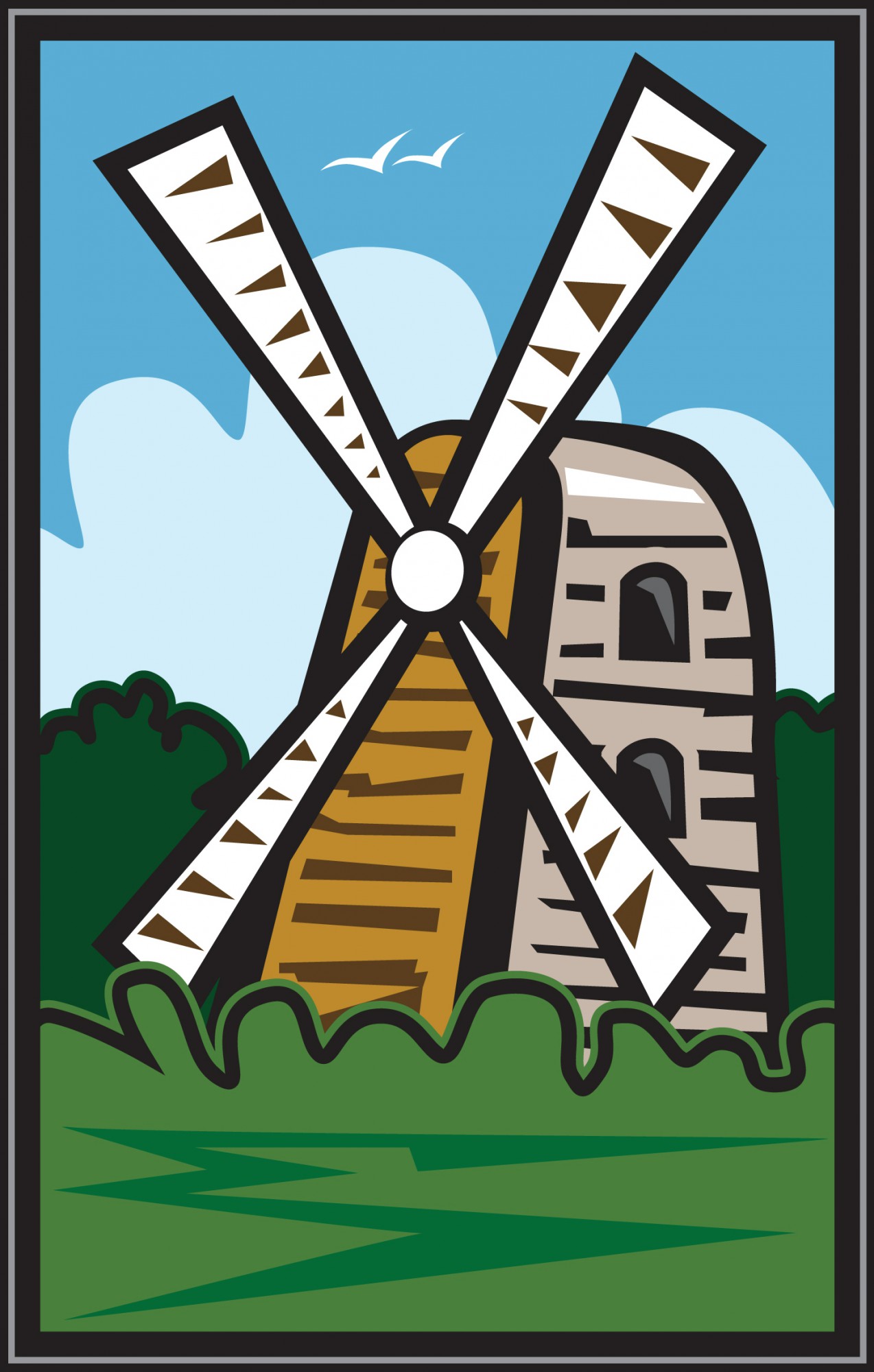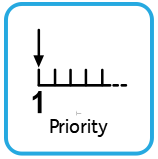Curriculum
Please see below sections regarding our curriculum. To find out more information about our curriculum, please contact Lucy Crisp, Deputy Headteacher.
We recognise that our amazing learners are continually developing and in response our curriculum is evolving and changing to ensure that every learner has access to an ambitious, personalised curriculum which supports them to develop the skills, knowledge and understanding to be successful and prepared for their next steps.
Our curriculum focuses on preparing our learners for not only the next stage in their lives but also adulthood. We believe our role is to support every child on their journey to:
Be confident communicators who develop a functional mode of communication and can express their emotions, needs and choices to those around them
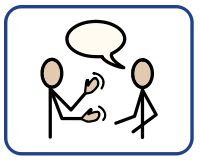
Be successful learners who enjoy learning, reach their potential and are ready for the next steps in their lives.
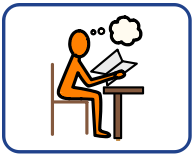
Have increased independence to be able to lead safe, healthy, happy and fulfilling lives and experience respectful relationships.
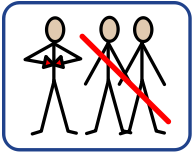
Be active in the community to become a valued member of their community and access new experiences.

Our curriculum is designed to ensure that every learner experiences, develops, and consolidates skills and knowledge that will have the greatest impact on their daily lives. To provide the best possible education, our curriculum is flexible and personalized to meet individual needs while building on each learner's strengths and interests.
-
Personalised Learning: The curriculum is tailored to meet individual needs, ensuring that each learner can build on prior knowledge and experience success and achievement through carefully planned and engaging learning opportunities.
-
Enrichment Activities: We offer new and exciting experiences through enrichment activities, enhancing learning by providing opportunities to practice skills within the school and the local community.
-
Therapeutic Provision: Embedded throughout the curriculum, therapeutic provision ensures that every learner’s communication, medical, sensory, regulation, and physio needs are met each day.
Our approach supports learners in building on their prior knowledge, experiencing success, and achieving their potential. By providing a range of learning opportunities and experiences, we aim to foster a love for learning and help learners develop skills that will benefit them throughout their lives.
So that we can achieve our aims and ensure that our curriculum maximises the potential of each of our learners we follow a curriculum model that has three layers. All layers run alongside and complement each other:
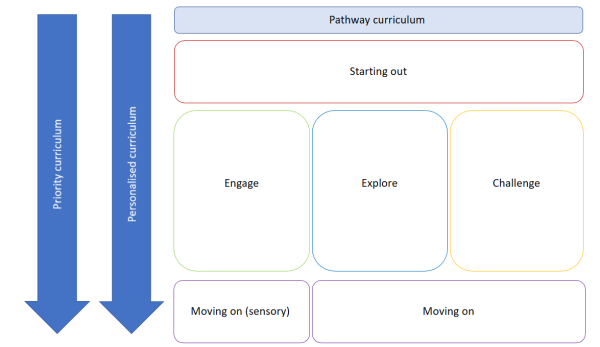
Layer 1: Priority curriculum
As a school our priority is to support learners to develop their communication and self-regulation skills as we feel that this will enable them to lead happy and successful lives and feel ready to learn.
The priority skills will enable learners to build relationships with others, express themselves, make sense of what is happening and manage and regulate their emotions and behaviour safely.
For all learners, regardless of their learning route, the priority curriculum, is embedded and integrated throughout the curriculum and day. Our schools universal offer supports this. Staff work closely with both therapists and parents to ensure that the learners holistic needs are met.
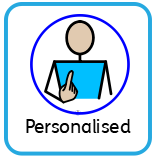
Layer 2: Personalised curriculum
The personalised curriculum is made up of the learners' individual outcomes and targets that are recorded in their EHCP and annual review. These are used to inform both timetabling and planned learning activities.
Sufficient opportunities are planned for learners to work on their targets. In some cases, this may mean daily practice, but in others it may mean once or twice a week.
![]()
Layer 3: Pathway curriculum
Our curriculum is built around five pathways. Each pathway has been carefully planned to ensure that learners develop the appropriate knowledge and skills, matched to their developmental level.

Six Areas of Learning
We recognise that every learner’s learning journey is unique and that they may follow different pathways at different times. To enable a flexible approach to be achieved, the curriculum subject areas remain the same regardless of the pathway.
The curriculum has been divided into six main areas of learning:
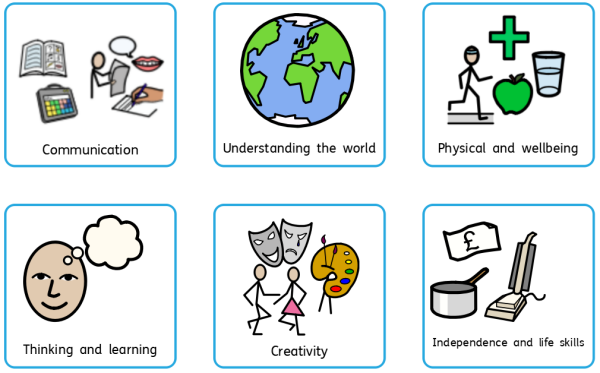
Teaching and learning
A topic-based approach is used across all pathways, apart from Moving on. Topics support delivery of a motivating and balanced learner-centred curriculum. A new topic is covered every term and topics follow a 5 year rolling program.
Teachers plan learning activities, that support learners to make progress both within their personalised curriculum and the pathway curriculum they are following.
Delivery Framework
Religious Education (RE) is integrated into the curriculum and is delivered through Understanding the World, the termly topic, and assembly themes. This approach ensures that learning activities are appropriate and relevant, allowing teachers the flexibility to tailor content based on the individual needs, abilities, and past experiences of learners.
Learners are offered experiences that:
-
Encourage learners to develop respect and tolerance for others.
-
Enable learners to respond to life and the world around them.
-
Enable learners to learn about various religions, including their beliefs, rituals, artefacts, buildings, festivals, and significant figures.
Parental rights
Parents have the right to request that their child be withdrawn from part or all of the RE content. Such requests can be made by contacting the class teacher directly.
Relationships and Sex Education (RSE) provides a framework for learners to understand the emotional, social, and physical aspects of growing up, relationships, and physical relationships where appropriate. RSE is informed by the ‘PSHE Association Framework for SEND’.
Key Objectives of RSE
-
Equip learners with the knowledge to stay safe
-
Support informed decision-making about wellbeing, health, and relationships
-
Build self-efficacy in learners
We recognise that our learners may be more vulnerable in society, making RSE crucial for helping them stay safe, healthy, and happy as they grow up and in their future lives.
Statutory Nature of RSE
RSE is a statutory subject within our school curriculum, forming part of lifelong learning that begins at reception and continues throughout a learner's journey at Edith Borthwick and beyond. We ensure that RSE is age and developmentally appropriate, adapting the content as learners progress through the school.
Core Elements of RSE Teaching
-
Incorporation of RSE into daily practice and language use.
-
Utilization of the Zones of Regulation and key stage-appropriate core vocabulary, including anatomical names for body parts.
Parental Involvement
For secondary-aged pupils, we are required to teach sex education. Prior to the delivery of RSE, parents will be informed by the class teacher about the content to be covered. Parents have the right to request that their child be withdrawn from some or all of sex education at the secondary level, up to and until three terms before the child turns 16. However, there is no right to withdraw from relationships education or health education. For more information on the right to withdraw a child from sex education, please refer to our RSE policy.
We ask for feedback for parents/carers and staff when we are updating our Relationships & Sex Education (RSE) policy, which is done annually. You can see a copy of the latest message that was sent out at the start of November 2025 below:
Dear Parent/Carer,
Relationships & Sex Education (RSE) Policy
The government has introduced new guidance on Relationships and Sex Education (RSE) and Health Education, which schools are required to follow from 1st September 2026.
In preparation for this, we are reviewing our curriculum and policy to ensure our provision is appropriate for all pupils, taking into account:
Age and stage of development
-
Physical and emotional maturity
-
Religious and cultural background
-
Special educational needs and disabilities (SEND)
Please find attached the updated RSE policy for your review.
If you have any questions, please see the SLG and if you would like to provide feedback, please complete the Relationships and Sex Education (RSE) policy feedback form by the end of Wednesday 12th November 2025.
The 'Relationships and Sex Education (RSE)' section can be found on our website. Information will be updated with the new curriculum information once it has been completed - please also see the website for further details on coverage for each key stage.
Thank you for your support as we implement these important changes.
If you have any further questions or need additional information, please feel free to ask!
Knowledge Trackers
Please see below for our Knowledge Trackers.
Music is integrated into the curriculum and delivered through Creativity, the termly topic, assembly themes and experience days. Please explore the music development plan for further information:
